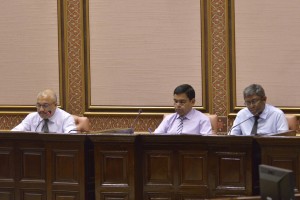The Ministry of Finance has approved a budget of MVR 525,000 (US$34,047) for President Dr Mohamed Waheed’s trip abroad two days before the run-off election.
Waheed has previously described this as a personal trip to Singapore to attend to First Lady Ilham Hussain’s medical matters.
Waheed, who on Sunday an hour before his presidency expired declared that he would remain in office until run-off polls take place on November 16, is scheduled to leave tonight night – just over a day before the polls.
Waheed’s decision – based on a Supreme Court verdict signed by the four judges who had annulled the initial September 7 presidential election – contradicts a parliamentary motion to appoint the speaker of parliament as an interim president, citing Article 124 of the constitution.
While the President’s Office stated that Waheed and his cabinet of ministers will be serving for the additional six days without remuneration, the budget for the trip is over five times the monthly salary for the head of state.
“I do not think there is much I can do from here, things that I cannot do over the phone,” Waheed was quoted as saying in local media.
Local media further reported that the President’s Office had initially requested for a budget of MVR 1.3 million (US$84,306) for the trip, but the finance ministry did not approve the full amount citing procedural matters.
Finance Minister Abdulla Jihad confirmed the figures to Minivan News, stating that the funds have now been released.
“What we at the ministry follow is the Supreme Court’s orders. Since they have stated that the president can remain in government until a new president is elected, we are entitled to release these funds for President Waheed’s trip,” Jihad explained.
Jihad also said that the over half a million rufiyaa has been released for an official presidential trip to Hong Kong and Malaysia scheduled for November 14 -15.
Waheed however has informed local media that he is leaving on the night of 14th on a “personal trip regarding medical treatment” of First Lady Ilham Hussain.
He declined from stating even a tentative time of return, saying instead that he “will need to consider the situation back in the Maldives first”.
President Waheed further stated that he does not have a direct role in the swearing in of a newly elected president, and therefore did not believe that his absence would cause any difficulties.
“No legitimate government, do not carry out transactions”: Finance Ministry
Finance Ministry Permanent Secretary Ismail Ali Manik also confirmed to Minivan News that the funds have been released for President’s Waheed trip, adding that further details can be provided by Financial Controller Ahmed Manik.
Earlier in the week, the ministry circulated an internal memo instructing all staff members to refuse to run any financial transaction of state funds without the explicit permission of the financial controller.
The memo – signed by Permanent Secretary Manik – stated that the Waheed administration had constitutionally come to an end on November 10, and therefore to refrain from carrying out any financial transactions of the state within the date of the memo and the establishment of a new government.
A senior official of the Finance Ministry – on condition of anonymity – stated that the memo was released with the purpose of protecting civil servants in the ministry.
“The political appointees will leave at some point, but the civil servants will stay on. It is the civil servants who will then in the end be held responsible for whatever transactions that may have taken place in this time of uncertainty,” he stated.
“It is the minister’s personal view that he should be following the Supreme Court verdict. The permanent secretary has – as is evident by the memo – declared that there is at the moment no head of the ministry and therefore asked all staff to go to the financial controller for approval of all transactions,” he said.
Financial Controller Ahmed Manik was not responding to calls at the time of press.
